
Women and children are disproportionately affected by natural disaster and war - pregnant women face dangerous deliveries and, in unprotected refugee settlements, rape, trafficking and gender-based violence increase. IPPF delivers essential lifesaving services for women, men and children in times of crisis.
Articles by Emergencies

IPPF's humanitarian response: dignity, protection, care
During times of crisis sexual reproductive health services are a necessity. Access to sexual and reproductive health services, even in the midst of war or natural disaster, is a human right which does not only saves lives in the short run, but also helps build resilience amongst refugees and displaced people. The statistics of women affected in humanitarian crises are shocking. It is estimated that more that 33 million of the 130 million people are in need of humanitarian assistance, are women and adolescent girls of reproductive age - 500 of these women and girls die every day from complications related to pregnancy and childbirths. WANT TO GET INVOLVED? SUBSCRIBE NOW TO GET UPDATES FROM IPPF SUPPORT OUR WORK WITH A DONATION

When should I take emergency contraception?
When can emergency contraception be used? Emergency contraception is recommended after any episode of unprotected or inadequately protected sexual intercourse for any girl or woman or person with a uterus who wants to avoid becoming pregnant. Unprotected or inadequately protected sexual intercourse generally means that either: No contraceptive method was used during intercourse, Or that the effectiveness of the contraceptive method was compromised during its use. Example: The effectiveness of contraception may be lower due to, for example, irregular use of pills or incorrect use of a condom. If a woman is aware of these risks, she may reduce the chance of getting pregnant by taking emergency contraception. The time frame for using emergency contraception It is important to let women know that emergency contraception may still be used later than ‘the morning after’. However, emergency contraception pills should be taken as soon as possible after unprotected or inadequately protected sexual intercourse. The effectiveness of emergency contraception pills is highest when they are taken within 24 hours of unprotected sex. Emergency contraception can be used to prevent pregnancy up to 120 hours (five days) after unprotected sex. Repeat use of the emergency contraception There are no known adverse health effects if emergency contraception pills are used more than once during the same menstrual cycle. Although the bleeding pattern will be affected. Repeated use of emergency contraception pills would entail the same contraindications as those of regular hormonal contraceptive methods. Although no long‑term adverse health effects are to be expected from repeat use, women do suffer more from side effects if they use emergency contraception pills repeatedly, particularly bleeding irregularities. Effectiveness of emergency contraception pills is not affected by repeat use. However, overall effectiveness over one‑year use is lower than most modern contraceptives, so emergency contraception pills should not be recommended as an ongoing method of contraception. Concerns have been raised about whether easy access to emergency contraception pills could lead to lower uptake of regular contraception. However, there is no evidence of such a relationship. Example: Women who receive an advance supply of emergency contraception pills have been found to be more likely to use them when they have had unprotected sex, but are not more likely to abandon regular contraception. However, if overall effectiveness over one‑year use of emergency contraception pills is lower than most modern contraceptives, so emergency contraception should not be recommended as an ongoing method of contraception. If a woman has many episodes of unprotected or inadequately protected sexual intercourse, it may be advisable to recommend that she considers using a more effective contraceptive method or that she changes her current method. An IUD as emergency contraception may be useful in this case, and should be suggested as a first choice. What about STI risk? Emergency contraception pills do not prevent the transmission of sexually transmitted infections (STIs). It is important to emphasise that this applies to all contraceptives other than condoms and should not constitute a selective bias against emergency contraception pills. If a woman is at risk of an unwanted pregnancy, she may be at risk of STIs as well and STI and HIV testing could be offered.
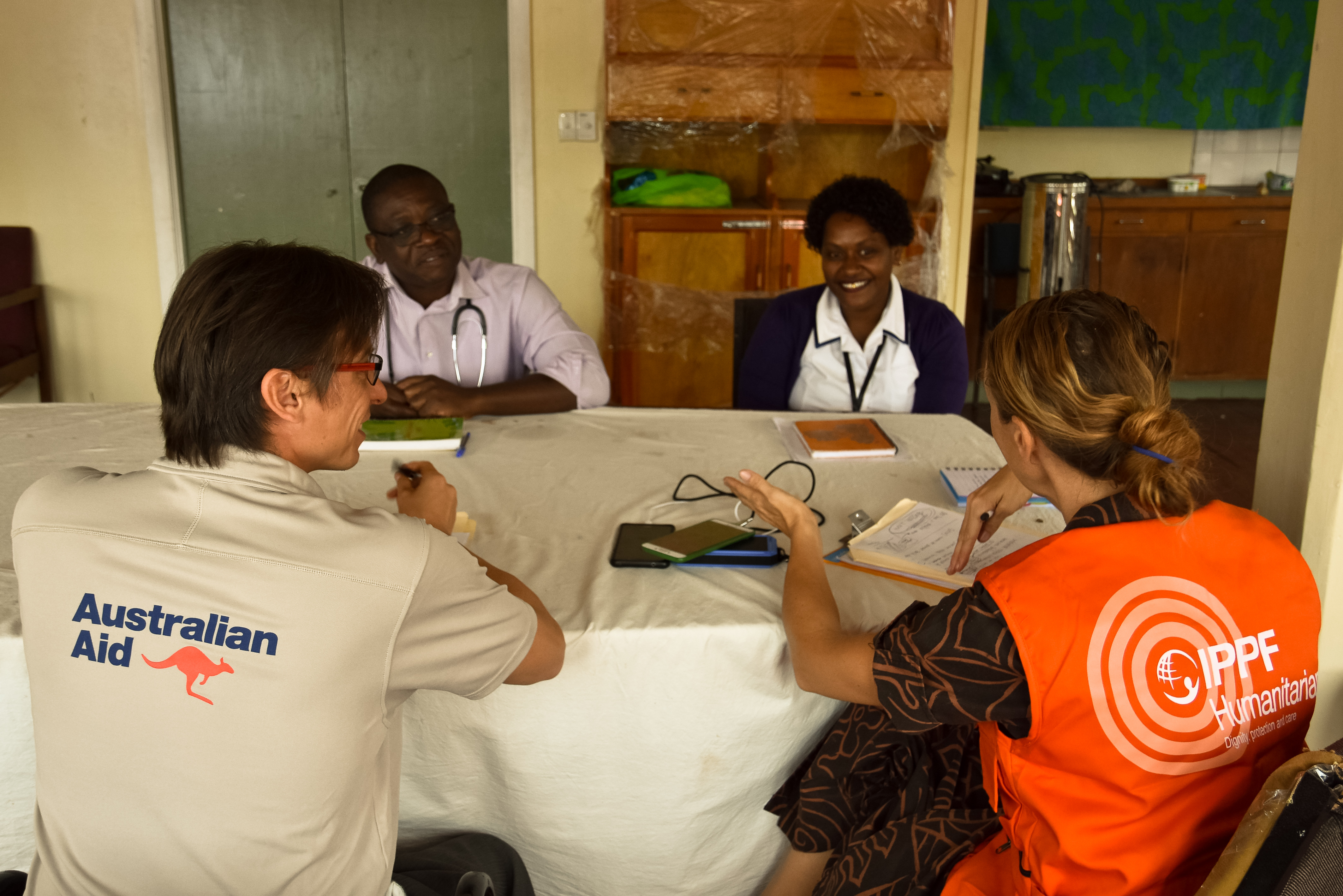
SPRINT: Sexual and reproductive health in crisis and post-crisis situations
The SPRINT Initiative provides one of the most important aspects of humanitarian assistance that is often forgotten when disaster and conflicts strike: access to essential life-saving sexual and reproductive health services. We build capacity of humanitarian workers to deliver essential life-saving sexual and reproductive health services in crisis and post-crisis situations through the delivery of the Minimum Initial Service Package (MISP) for reproductive health in emergencies. Through funding from the Australian Government's Department of Foreign Affairs and Trade (DFAT), our SPRINT Initiative has brought sexual and reproductive health to the humanitarian agenda, increased capacity and responded to a number of humanitarian emergencies. Australia has funded the SPRINT initiative since 2007. Since then, the SPRINT initiative has responded to 105 humanitarian crises and worked with partners in 99 countries. SPRINT has reached over 1,138,175 people, delivering 2,133,141 crucial SRH services, and continues to respond to ongoing emergencies. In each priority country, we work with an IPPF Member Association to coordinate and implement life-saving sexual and reproductive activities. Through these partnerships, SPRINT helps strengthen the enabling environment, improve national capacity and provide lifesaving services during times of crisis. You can read more about IPPF Humanitarian’s Programme here. Australia's location in the Indo-Pacific provides DFAT with a unique perspective on humanitarian action. Australia is committed to helping partner governments manage crisis response themselves. This is done through building the capacity of the national government and civil society to be able to respond to disaster. DFAT also works with experienced international partners to prepare for and respond to disasters, including other donors, United Nations agencies, the International Red Cross and Red Crescent Movement and non-government organisations.
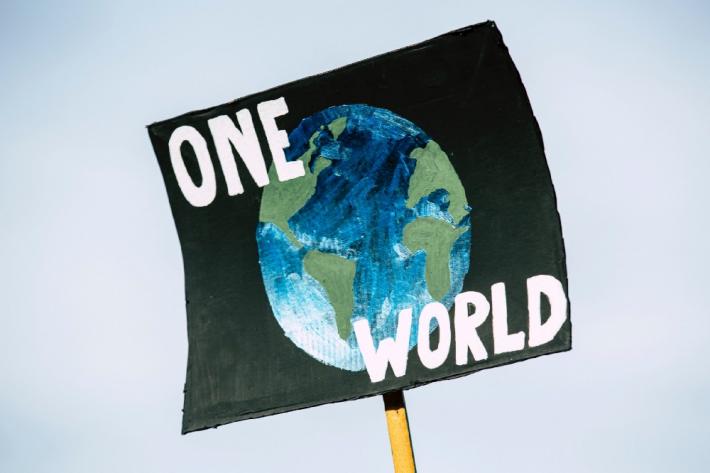
Is the climate crisis a gender equality issue? Absolutely
The climate crisis is affecting everyone, but there is no doubt that some communities and groups of people are being more impacted than others. For example, women and girls, black and brown communities, and communities in the global South are among the hardest hit by climate change — and yet they have contributed the least to the problem. Instead, they suffer some of the worst impacts, from events like landslides, devastating floods, and prolonged droughts which have dried up crops and water sources. As a result, women can be forced to walk longer distances in search for food and water to feed their families, which exposes them to other risks of harassment, discrimination, sexual violence, and trafficking. This may also lead to negative health impacts like sexually-transmitted infections (including HIV), unintended pregnancies, and post-traumatic stress. The destruction of health services due to disasters also may lead to an increase in unplanned pregnancies because there is limited access to reproductive health services. In any crisis gender-based violence increases, and children in families where violence is present are much more likely to be abused or themselves abusive, which continues the terrible cycle of violence. Furthermore, in periods of crisis girls are often the first to drop out of school to help their families make money, to be put in charge of domestic chores or looking after their siblings, as well as being ‘given away’ in early forced child marriages in exchange for a ‘bride price’, to ease financial pressures that families might be facing. The climate crisis is worsening the problems that women are already experiencing in society, such as restricted rights, access to financial resources, training and technology, and political decision-making spheres, which often prevents women from playing a full role in tackling climate change and other environmental challenges. But there are solutions that can be implemented, like involving women in decision-making, whether that’s at home or at a political level, and involving women in leadership roles, as there is no acceptable reason to exclude us in something that affects us so deeply. Women are, of course, experts in many fields and capable bringing long-term solutions to the table. Global leaders must also ensure that finance for climate-related projects (which focus on women and girls) is accessible to women as well as men, and is designed to generate mutual benefits for all, while not increasing patterns of inequity. These projects should support communities to include specific measures to protect women and girls after disasters, like providing health services including reproductive health and climate education, and also women’s economic empowerment through adopting measures to protect their income-generating activity (like agriculture) in case of disasters and to aid a quick recovery. Finally, leaders must understand the intersectionality of climate change and that we cannot achieve climate justice when there are still other injustices like gender inequality, and social and racial injustice. So is the climate crisis is a gendered issue? Of course — but there are solutions. Let’s put them into practice now.
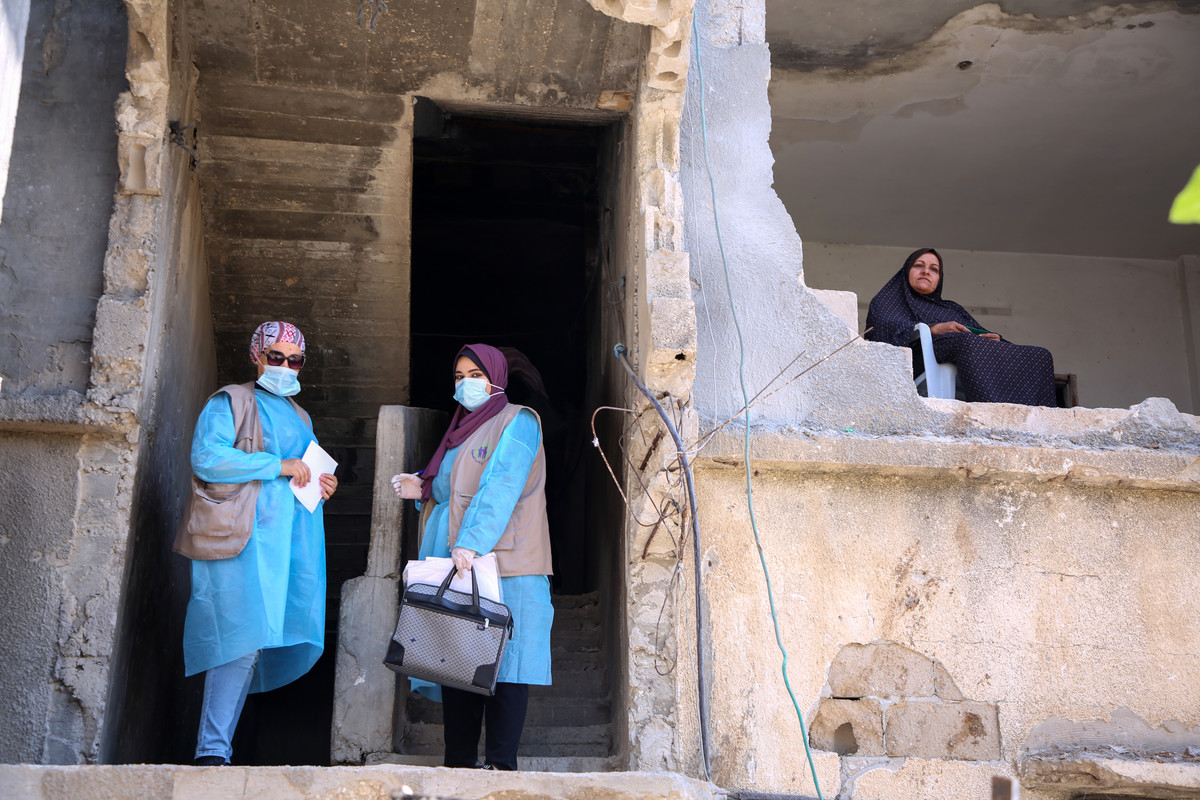
Why are women and girls the worst affected by humanitarian crises?
An increasing number of people globally live in areas badly affected by conflict, natural disasters, and other fragile humanitarian settings. As a result, over the past decade there have been an estimated 51 million new and existing internally displaced people, and the number of refugees has doubled to 20 million. Women and girls are disproportionately affected by these events by a significant margin – but why? When structures of stability and safety are disrupted (or in some cases, never existed at all), women and children – particularly girls – are left especially vulnerable. Lacking the usual protective measures such as the family unit or home, they are at an increased risk of rape, trafficking, forced marriage, and child/early marriage. A staggering 70% of women in humanitarian settings are likely to experience gender-based violence. This brings us to the crisis currently at the forefront of many people’s minds: Afghanistan. Right now, there is a serious risk emerging for women and girls within the country, which may well lead to restrictions on their movements and choices, grave concerns over their personal safety, and blocked access to essential healthcare. Years of hard work towards gender equality and the prevention of violence against women are threatened to be undone and worsened in Afghanistan – a troubling situation which must be mitigated. Exposing weaknesses in health systems Humanitarian crises expose weaknesses in health systems, and as such there is a heightened risk of unattended births. With one in five women likely to be pregnant at the time of a crisis, 20% of these deliveries will experience complications. Transmission rates of STIs, including HIV, also increase in emergencies, as do unsafe abortions. The right to education takes a major hit in times of crisis. Adolescent girls in conflict zones are 90% more likely to be out of school, and as a result of the COVID-19 pandemic almost 24 million children, adolescents, and young people were at risk of not returning to school in 2020 – including 11 million girls and young women. Not going to school increases the possibility that girls will become victims to various types of violence such as child, early and forced marriage, and increases the risk of unplanned teenage pregnancies. In fact, COVID-19 has only exacerbated gender inequality and created a double crisis in tandem with humanitarian emergencies. Rates of gender-based violence have gone up around the world in both stable and crisis settings, with 15 million new cases predicted for every three months of lockdown. It has also impacted many people’s ability to work, with women and young people aged 15-29 working in the informal sector being hit the hardest. The economic empowerment of women, manifested in their choice of where and when to work, and of the terms and conditions of that work, is intimately linked to reproductive empowerment and reproductive outcomes. The climate crisis also poses a severe threat to women and girls, and as the situation continues to become more serious, the sexual and reproductive health and rights of millions in high-risk areas will continue to deteriorate. Deeply ingrained, systemic discrimination means they are more likely to experience the harmful effects of the climate crisis, including reduced or unavailable maternal health services, reduced access to contraceptive and safe abortion care, reduced access to safe water during pregnancy and childbirth, an increased risk of SGBV, as well as the wider threat of displacement. What is IPPF doing about it? IPPF – through our Member Associations – are responding to the climate crisis, protracted humanitarian situations, and the impacts of COVID-19 on women and girls, by ensuring the continuity of sexual and reproductive healthcare in the hardest hit, and hardest to reach, places. In 2020, we reached 5.5 million people with lifesaving healthcare in fragile and humanitarian settings. Sexual and reproductive health is a key component of the care needed for people experiencing SGBV, as well as those needing safe abortion care, maternal healthcare, STI treatment and more. But SRHR in humanitarian settings is often overlooked and remains under-resourced – what we are currently witnessing around the world only confirms the urgent need for further action by those in positions of power. Main image: a member of an outreach team visiting women in the Gaza Strip, Palestine

Papua New Guinea: serving essential healthcare during COVID-19
Ravat Village in East New Britain, Papua New Guinea, is located south of the province’s capital Kokopo. Despite being located approximately 30 minutes' drive from the capital, lack of access to transportation and subsequent stay-at-home orders during the COVID-19 pandemic have left many communities further isolated. The Papua New Guinea Family Health Association (PNGFHA) was quick to respond to ensure life-saving sexual and reproductive healthcare (SRH) continues during the pandemic, by setting up mobile clinics in the most remote villages. PNGFHA mobile clinics are supported by the Australian Government under the IPPF’S SPRINT initiative. "I knew I would come here" Diane Benson, a young mother of three, is one of the first to arrive at the Ravat Village mobile clinic. She has been wanting to get reliable information on contraceptive options. “I haven’t been able to travel out to town to get the information or services [on SRH]. So as soon as I knew PNGFHA were coming to the village, I knew I would come here for advice on family planning.” Many women like Diane face the same challenges of transportation and finances to access SRH services in other clinics. The fear of being infected with COVID-19 at health facilities also had deterred many from seeking SRH services. Diane returned home with a contraceptive implant fitted in her arm after consultation at the PNGFHA mobile clinic. Before she leaves, she shared her dream to finish her education that was halted with her pregnancies and raising her children. “I would like to go back to school...then I would also like to go to university. I would like to become a teacher, so I can help other students and young mothers like me who would like to go back and finish their education.” Continuous access to essential SRH services Pre- COVID-19, it is estimated that 214 million women and girls globally are not using modern contraception, despite wanting to avoid pregnancies. On top of that, the WHO identified PNG as one of the highest countries with maternal and newborn mortality rates in WHO’s Western Pacific Region. The pandemic has further hampered this dire situation. The Executive Director of PNGFHA, Michael Salini, said: “PNGFHA mobile clinics serve some of the most vulnerable women and girls in the community. With this support, we are able to provide essential SRH services. While the public clinics are focusing their efforts on managing COVID-19, PNGFHA mobile clinics are deployed and reaching out to communities to ensure SRH access are available and not deprioritized in a crisis setting.” PNGFHA mobile clinics have visited communities in especially in remote areas and smaller towns across Papua New Guinea since March 2020. The mobile clinics provide a wide range of SRH services and consultations on family planning, antenatal and postnatal care, immunizations and smear tests/pap smears, and other aspects of women’s health and wellbeing. A localized approach Christine Atu is a local aid worker that coordinates the mobile clinics in East New Britain. She is a firm believer that proper consultation of any SRH services is vital to assisting patients in making an informed decision. Christine sees the mobile clinic as a crucial educational hub for women to understand their sexual and reproductive health rights besides administering treatments. While women and girls often visit the mobile clinics, Christine’s local understanding of social norms has helped her develop a method to include men in her consultation, especially for couples. “I find it works if I write a note to the husband to come back to the clinic with their wife because the little note is like an invitation...When I write a note, they feel like they are invited, and they will show up. When that happens, I am very happy, and I dedicate one day every week in the clinic to just sit with people and do counselling.” Christine hopes that the work and effort she put into are breaking the cultural taboo surrounding sexual and reproductive health in the area. She also has seen more men coming with their wives to the clinic, which is a positive shift in the local community, especially in ensuring successful family planning.

In pictures: World Humanitarian Day 2021
This World Humanitarian Day we reflect on the incredible work undertaken by our humanitarian response teams over the last 12 months. Last year, IPPF reached approximately 5.5 million people in humanitarian crises through our local Member Associations. This achievement would not have been possible without the dedicated and heroic healthcare teams providing vital sexual and reproductive healthcare in the most fragile humanitarian settings. COVID-19 response in Papua New Guinea Papua New Guinea Family Health Association (PNGFHA) PNGFHA responded to the COVID-19 outbreak in PNG, supported by the Australian government. With access to emergency healthcare facilities now extremely limited, PNGFHA health workers travel to hard-to-reach areas providing sexual and reproductive healthcare to the most marginalized communities.Clients like Vavine Kila receive a consultation at the PNGFHA mobile clinic. Share on Twitter Share on Facebook Share via WhatsApp Share via Email The humanitarian response teams taking healthcare into people's homes in Gaza Palestinian Family Planning and Protection Association (PFPPA) On 10 May 2021, Israel launched airstrikes on the Gaza Strip, killing over 220 people (including women and children) and leaving over 75,000 displaced. At the time, an estimated 87,000 women in the Gaza Strip and nearby areas were pregnant. The PFPPA humanitarian response team visited families in their homes, with each household expected to have four to five women of reproductive age needing healthcare. Share on Twitter Share on Facebook Share via WhatsApp Share via Email Offering holistic care to families in Gaza Palestinian Family Planning and Protection Association (PFPPA) Children account for close to 50% of the population in Gaza. As part of the response, PFPPA youth volunteers entertained the children while their family members received life-saving sexual and reproductive healthcare and psychosocial support by the humanitarian response teams in privacy. Share on Twitter Share on Facebook Share via WhatsApp Share via Email Ensuring ante- and post-natal care in the aftermath of an earthquake in West Sulawesi Indonesia Planned Parenthood Association (IPPA) On 15 January 2021, a 6.2 magnitude earthquake struck the West Sulawesi province in Indonesia leaving over 15,000 displaced, including many pregnant people and nursing mothers.As part of its response efforts, the IPPA set up mobile clinics near the shelters to provide vital ante- and post-natal care. Share on Twitter Share on Facebook Share via WhatsApp Share via Email A super cyclone and a pandemic Family Planning Association of India (FPAI) On 20 May 2020, severe Cyclone Amphan hit the Indian state of West Bengal, affecting millions of people in and around the state capital Kolkata. Emergency crises during the COVID-19 pandemic intensifies the impact of the disaster and puts a strain on health systems and access to sexual and reproductive healthcare.FPAI responded by providing emergency sexual and reproductive healthcare to affected communities, particularly focusing on the most marginalized and vulnerable people including the LGBTI community, sex workers, pregnant women, and survivors of sexual and gender-based violence (SGBV). Share on Twitter Share on Facebook Share via WhatsApp Share via Email Providing healthcare to hardest hit communities after Cyclone Yasa The Reproductive and Family Health Association of Fiji (RFHAF) In mid-December 2020, a category 5 severe Tropical Cyclone Yasa hit the island of Fiji and neighbouring Lau group of Islands. IPPF’s Member Association, RFHAF, was supported by the Australian government to provide life-saving sexual and reproductive healthcare in the hardest hit communities, including counselling on STI risk reduction, first-line support for survivors of SGBV, and contraceptive and ante-natal care. Share on Twitter Share on Facebook Share via WhatsApp Share via Email
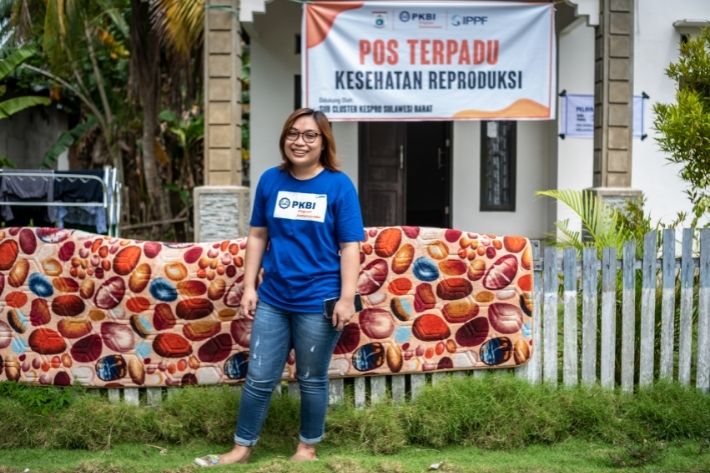
Dr Ratni: a day in the life of an emergency response volunteer
Dr Ratni Palullungan is a fearless doctor, mother, and selfless volunteer providing sexual and reproductive healthcare to marginalized groups in fragile humanitarian settings. Currently she is deployed with the Indonesian Planned Parenthood Association’s (IPPA/PKBI) response team in Majene District, West Sulawesi, following a magnitude 6.2 earthquake which occurred in January 2021. In an open diary, Dr Ratni shares what a day in the life looks like for a volunteer doctor providing care to those affected by the earthquake. 5.30 – 8.30am I get up quite early and have my quiet time (prayer), then I gather my dirty laundry. Currently, I live with other volunteer teams in a place called PKBI Post in Majene, and there is a cooking schedule for everyone. After prayers, chores and breakfast, I get my daughter ready for the day as she accompanies me to work temporarily. After that, the team and I prepare medical equipment and medicine for the day's humanitarian mission. 8.30 – 11am Today the first location is Maliaya Village Health Centre, in Malunda District, Majene. Here, I attend to and examine 25 pregnant women. The pregnant women, on average, get married at a fairly young age. There are definitely risks to their reproductive health. There is a 43-year-old mother who is currently pregnant with her 11th child. To limit health risks, we advise her on the various safe family planning options. There is also a 38-year-old woman who is eight months pregnant. However, the size of her belly is very small for a woman in her third trimester. In fact, I initially thought that she was only four or five months pregnant. After I examined her, it turns out that she is categorized as a ‘malnourished’ pregnant woman. It is very unfortunate because she admitted that she eats food without paying attention to her nutrition intake. In fact, she tends to eat instant noodles. So I advised her to drink milk, eat only nutritious foods, and always taker her vitamins. 11am – 2pm After visiting Maliaya Village, I travelled to Kabiraan Village. This village was severely affected by the earthquake. Here, I walk around the evacuation camp, most of which is still occupied by displaced people in this post-earthquake period. Even under the evacuation tent, I continue to conduct health examinations for pregnant women. Due to the large number of cases of young marriages in Kabiiran Village, the team and I decide to conduct counselling sessions for the teenagers here. I advise the teenagers to get to know the risks that might occur to their reproductive health if they marry too young. 2 – 4pm The health volunteer team and I are finally able to take the time for lunch. We have our lunch near the beach, and get to enjoy local seafood as our menu. Enjoying the seafood while looking at the beautiful sea view is a precious time. I certainly won't forget this moment. 4 – 6pm We continue our journey to East Lombong Village. We have many elderly patients here. Yet interestingly, during one of the patients’ examination, there is one mother who wants to get the contraceptive implant. For me, this is quite a shock, given that we rarely find women in this village who want to do family planning. The mother admitted that she did not know much about the family planning program and has many children. She is grateful that the PKBI volunteer team and I came to their shelter camp for the health examination. 6pm The team and I decide to return to the PKBI Post. Today’s journey is quite tiring but there is a sense of pride and emotion for having carried out a humanitarian mission for teenage girls, mothers, the elderly and even toddlers who still stay in the shelter camp. 7 – 8pm At the PKBI Post, after cleaning and tidying up the medical equipment again for the next day’s program, I prepare dinner for the team and assist my child with her studies. I am so grateful for each and every day that I am involved in this program. I feel encouraged to continue to provide sexual and reproductive healthcare to marginalized groups

Dr Ratni: a day in the life of an emergency response volunteer
Dr Ratni Palullungan is a fearless doctor, mother, and selfless volunteer providing sexual and reproductive healthcare to marginalized groups in fragile humanitarian settings. Currently she is deployed with the Indonesian Planned Parenthood Association’s (IPPA/PKBI) response team in Majene District, West Sulawesi, following a magnitude 6.2 earthquake which occurred in January 2021. In an open diary, Dr Ratni shares what a day in the life looks like for a volunteer doctor providing care to those affected by the earthquake. 5.30 – 8.30am I get up quite early and have my quiet time (prayer), then I gather my dirty laundry. Currently, I live with other volunteer teams in a place called PKBI Post in Majene, and there is a cooking schedule for everyone. After prayers, chores and breakfast, I get my daughter ready for the day as she accompanies me to work temporarily. After that, the team and I prepare medical equipment and medicine for the day's humanitarian mission. 8.30 – 11am Today the first location is Maliaya Village Health Centre, in Malunda District, Majene. Here, I attend to and examine 25 pregnant women. The pregnant women, on average, get married at a fairly young age. There are definitely risks to their reproductive health. There is a 43-year-old mother who is currently pregnant with her 11th child. To limit health risks, we advise her on the various safe family planning options. There is also a 38-year-old woman who is eight months pregnant. However, the size of her belly is very small for a woman in her third trimester. In fact, I initially thought that she was only four or five months pregnant. After I examined her, it turns out that she is categorized as a ‘malnourished’ pregnant woman. It is very unfortunate because she admitted that she eats food without paying attention to her nutrition intake. In fact, she tends to eat instant noodles. So I advised her to drink milk, eat only nutritious foods, and always taker her vitamins. 11am – 2pm After visiting Maliaya Village, I travelled to Kabiraan Village. This village was severely affected by the earthquake. Here, I walk around the evacuation camp, most of which is still occupied by displaced people in this post-earthquake period. Even under the evacuation tent, I continue to conduct health examinations for pregnant women. Due to the large number of cases of young marriages in Kabiiran Village, the team and I decide to conduct counselling sessions for the teenagers here. I advise the teenagers to get to know the risks that might occur to their reproductive health if they marry too young. 2 – 4pm The health volunteer team and I are finally able to take the time for lunch. We have our lunch near the beach, and get to enjoy local seafood as our menu. Enjoying the seafood while looking at the beautiful sea view is a precious time. I certainly won't forget this moment. 4 – 6pm We continue our journey to East Lombong Village. We have many elderly patients here. Yet interestingly, during one of the patients’ examination, there is one mother who wants to get the contraceptive implant. For me, this is quite a shock, given that we rarely find women in this village who want to do family planning. The mother admitted that she did not know much about the family planning program and has many children. She is grateful that the PKBI volunteer team and I came to their shelter camp for the health examination. 6pm The team and I decide to return to the PKBI Post. Today’s journey is quite tiring but there is a sense of pride and emotion for having carried out a humanitarian mission for teenage girls, mothers, the elderly and even toddlers who still stay in the shelter camp. 7 – 8pm At the PKBI Post, after cleaning and tidying up the medical equipment again for the next day’s program, I prepare dinner for the team and assist my child with her studies. I am so grateful for each and every day that I am involved in this program. I feel encouraged to continue to provide sexual and reproductive healthcare to marginalized groups
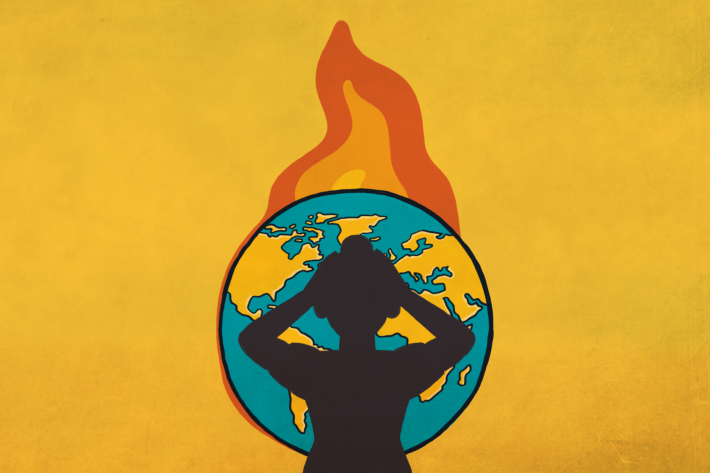
Climate crisis: a crisis for sexual and reproductive health and rights
There is no doubt that the climate crisis is one of the key challenges of our time – our planet is in a state of emergency and the time for action is now. An often overlooked aspect of the climate crisis is how it intersects with sexual and reproductive health and rights (SRHR). The list of impacts of this intersection is devastatingly extensive, and includes: Reduced or unavailable services in areas affected by climate-related disasters, meaning access to services like contraception, safe abortion care, and STI testing and treatment is blocked Harmful effects on maternal health due to increased heat exposure Reduced access to safe water during pregnancy and childbirth An increase in sexual and gender‑based violence, and child, early and forced marriages during humanitarian crises or displacement Neglect of the health and rights needs of people who typically face marginalization, such as those with diverse sexual orientations, gender identities and expressions, and sex characteristics. Underpinned by injustice The climate crisis is underpinned by grave injustice. Those that contributed least to the problem are most severely affected by its impacts, while also having most limited access to resources to adapt. As the climate crisis becomes more acute, the sexual and reproductive health and rights of millions of people in high-risk areas will continue to deteriorate. People with less power, resources or mobility will disproportionately bear the brunt of its harmful effects. Women and girls are at particular risk, with deeply ingrained, systemic discrimination meaning they are more likely to experience the harmful effects of the climate crisis. With this in mind, sexual and reproductive health and rights are crucial for people’s resilience and capacity to adapt to the climate crisis. Healthy and empowered individuals who can exercise their rights are better able to cope with all forms of adversity. What is IPPF doing about this? IPPF works in many of the countries and regions most severely affected by the climate crisis and prone to disasters. Through both our healthcare service delivery and advocacy for sexual and reproductive health and rights, we support communities to adapt to the increasingly unstable environment. In the past decade, we have significantly scaled up our humanitarian work. We are in countries before, during, and after a crisis, which allows us to protect the gains of our work and build resilience over the long term – as a result, in 2019 we served 4.6 million people in humanitarian settings. We also prioritize reaching the most marginalized and under‑served communities, with a strong commitment to advancing gender equality. One such community that IPPF has been supporting recently is that on the Pacific island of Kiribati, where humanitarian crises are increasingly prevalent due to extreme weather events exacerbated by the climate crisis. In the face of tsunamis, earthquakes, flooding, droughts, and occasionally cyclones, our Member Association, the Kiribati Family Health Association, continues to engage in a range of vital activities, from carrying out sexual health screenings to running youth groups educating the next generation about SRHR. Policy change is also a key element in the fight for climate justice. Our Member Associations drive policy change and champion the rights of marginalized and vulnerable groups at local and national levels. Additionally, as a globally connected Federation, we further work to effect policy change in support of sexual and reproductive health and rights and gender equality at regional and global levels. Learn more in IPPF’s position paper: The climate crisis and sexual and reproductive health and rights
Pagination
- Page 1
- Next page







